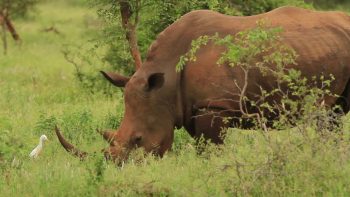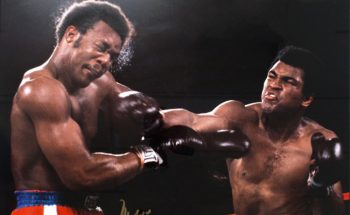 Gratitude can be really painful. Kind of like Rocky Balboa taking a punch. It may hurt a lot in the short run, but it will make you strong enough to win by the next fight.
Gratitude can be really painful. Kind of like Rocky Balboa taking a punch. It may hurt a lot in the short run, but it will make you strong enough to win by the next fight.
Recently, our daughter, Lauren, went on a trip to Africa with her college class. More specifically, they went to Uganda, Kenya, and Tanzania. Much of the time that she was over there, they were in a technologically dark area, with no cell phone access and only able to text us infrequently. One of the first text messages that we received was of her visit to a poor school. It turned out that the school managed to teach and take care of kids for $50/month. Lauren texted us that she was so moved that she felt called to donate $100 to the school. Ouch! I’m grateful that we raised a caring daughter, but that was my $100 that she donated. By the time we saw the text, she was in another dark zone with no chance for us to respond.
Next week was a time of worry. Without the inability to contact Lauren, we had no idea if she was alive or dead. We finally received another text saying that she was called to give away her shoes, and by the way, we need to get her some new running shoes. Oh boy, another chance to be grateful for a generous daughter. I began to wonder if she was going to come home broke and naked. Me broke and her naked.
It was great three weeks later when she finally arrived home. My bank account at last felt a little more secure. But it was not the end of my gratitude when she told us details of her trip. It  involved:
involved:
- Standing 15 feet from a wild white rhino
- Her raft turning over in class 5 rapids on the Nile river
- Bungee jumping 140 feet over the Nile river
This time I was grateful that I didn’t know any of this craziness in advance or I wouldn’t have let her go.
All kidding aside, gratitude is one of the most important tools that we have to help us through the physical and emotional turmoil of life. Dr. Robert Emmons1, who was one of my son’s professors at UC Davis, is perhaps the world’s leading expert on the benefits of gratitude, which includes:
- Stronger immune system
- Lowered pain levels
- Better sleep
- Lower blood pressure
- More alertness
- More positive emotions (happiness, joy, optimism, etc.)
- More social, outgoing, and less loneliness
- More forgiveness
- More helpful
- More generosity (I learned that the hard way from Lauren’s trip to Africa)
- Decreases negative emotions such as envy, regret, and depression
- More stress resistant – i.e. quicker recovery
- Improved self-worth
Personally, I would attest to gratitude making me more stress resistant. I have had a series of stressful events in my life for which I have found a  way to give gratitude. I have used them to thank God for the experiences that have made me a stronger and hopefully better person. Some examples:
way to give gratitude. I have used them to thank God for the experiences that have made me a stronger and hopefully better person. Some examples:
- I frequently had to put in over 100 hour work weeks going through medical school and residency, which was a 7 year period. These were times that were mentally grueling and physically exhausting from staying up 24 and even 36 hours at times. Marines go through ‘boot camp’ to prepare themselves for the battlefield. I think of medical school and residency as ‘mental boot camp’ to prepare for future work. For that strengthening, I am grateful.
- In 2004, I was in a propane fire which took the skin off my face, arms, hands and knees. It earned me a short stint in the burn ward for debridement (having the burnt skin taken off). In the process of putting out the fire, I knocked a disc out in my neck which caused nerve damage and severe loss of strength in my arm. This required bone graft surgery with plate and screws in my neck. I’m grateful for this experience for 2 reasons. First, prior to the fire, my fear was to be a burn ward patient as I saw that as the worst part of the hospital to be. I still respect the combination of propane and oxygen, but I no longer fear being a burn ward patient. Been there, done that, and could do it again if I had to (but please God, don’t make me have to). Second, the fire gave me experience in personally handling extreme pain. In fact, the following year I had gallbladder surgery and did not need to take pain medications.
- Both of my parents passed from cancer. They were both hospice patients, and I was executor for my dad’s will. While I’m obviously not grateful that they died, I am grateful that the experience gave me insight and knowledge that I utilized in writing Live, Love, and Let Go, which has helped many people.
 The benefits of gratitude are indeed reaped by the grateful person. I heard another example of this today. Mohammed Ali died yesterday and his friend and former opponent, George Foreman, was being interviewed. In 1974, Ali beat Foreman, which cost Foreman his title. Foreman could have been bitter over this, but instead he was grateful to Ali. Foreman said he used the fight to tell stories and generate interest in his later ministry work.
The benefits of gratitude are indeed reaped by the grateful person. I heard another example of this today. Mohammed Ali died yesterday and his friend and former opponent, George Foreman, was being interviewed. In 1974, Ali beat Foreman, which cost Foreman his title. Foreman could have been bitter over this, but instead he was grateful to Ali. Foreman said he used the fight to tell stories and generate interest in his later ministry work.
I suspect Foreman’s ‘attitude of gratitude’ is benefitting him today. Foreman and Ali had similar boxing careers and yet Ali developed brain damage felt secondary to repeated head blows. To my knowledge, Foreman has been spared. In an earlier blog, I discussed how nuns with a positive attitude were spared from Alzheimer’s. One can speculate that Foreman’s attitude is similarly sparing him.
Tough times are indeed difficult. A time of grieving, pain, frustration is appropriate. ![snuggie-fleece-blanket-with-sleeves-[2]-218-p](https://jamesabshiremd.com/wp-content/uploads/2016/06/snuggie-fleece-blanket-with-sleeves-2-218-p-350x350.jpg) However, I do encourage you to find something to be grateful for. No matter how bad the situation is, there must be something good about it (i.e. it could always be worse). Give thanks. It could be for a cup of water, a warm blanket, food, a home, friends, family, and of course the saving grace of Jesus. Remember, a hundred years from now, when we are in heaven, all physical and emotional wounds will be healed. For that, we can be grateful.
However, I do encourage you to find something to be grateful for. No matter how bad the situation is, there must be something good about it (i.e. it could always be worse). Give thanks. It could be for a cup of water, a warm blanket, food, a home, friends, family, and of course the saving grace of Jesus. Remember, a hundred years from now, when we are in heaven, all physical and emotional wounds will be healed. For that, we can be grateful.
- Emmons, Robert, ‘Why Gratitude is Good’, Greater Good, University of California, Berkeley, November 16, 2010.